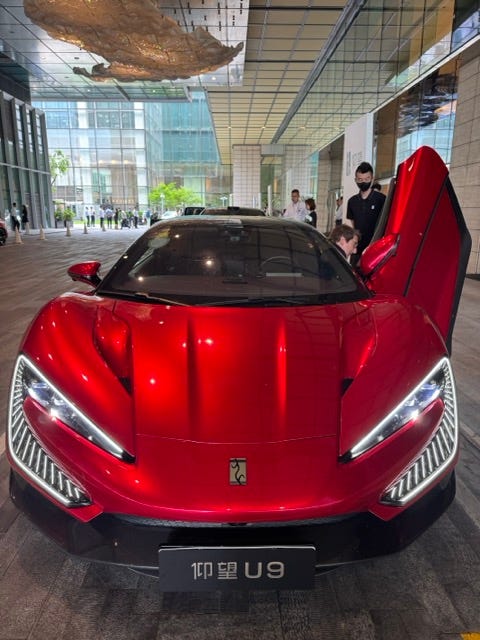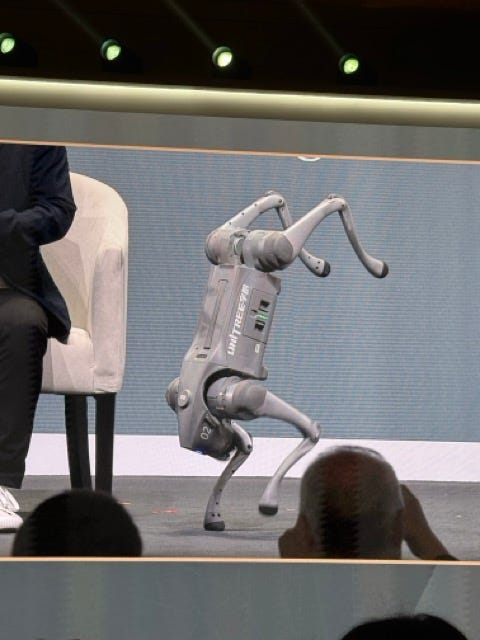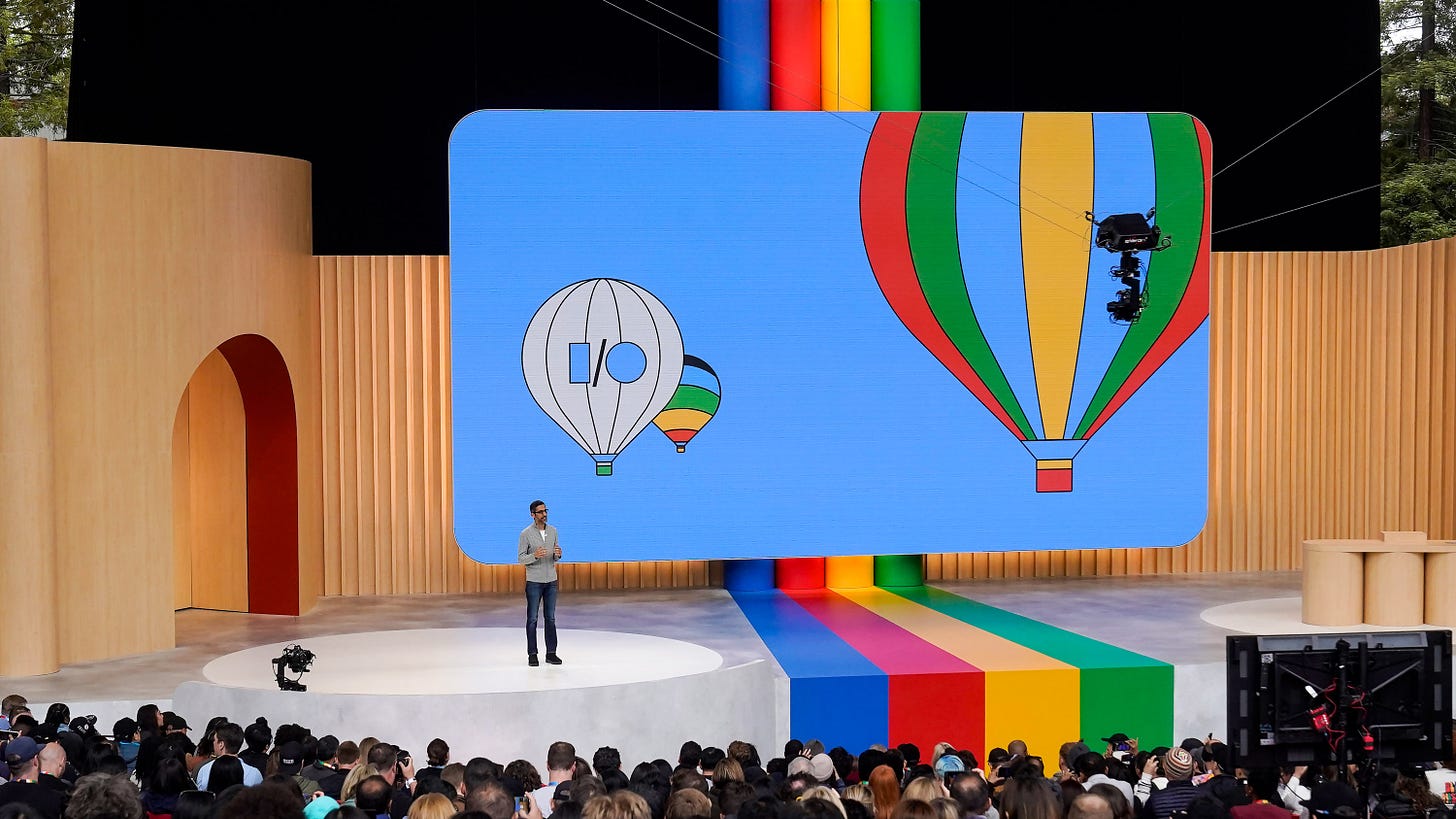12 Silicon Valley Startups Raised $305.7M - Week of May 26, 2025
🇨🇳 Hello China 💰 Jony Ive Now Owns 2.1% of OpenAI 🔍 Google I/O 2025 👊 Trump vs Harvard ⭐ Inside OpenAI’s Stargate Megafactory
Happy Monday!
Last week, had an incredible week reconnecting with family and friends in Beijing and Shanghai, and took advantage of the opportunity to attend the JP Morgan Global China Summit. There, I had the pleasure of interviewing Xiaomi’s Head of Internet Services, who offered fascinating insights into China’s booming tech landscape. Here are a few of my standout observations from the week:
First, the Rokid AR glasses genuinely amazed me. These aren't just another wearable—they translate and describe your environment in real-time, effortlessly surpassing the performance of my Meta glasses. Imagine instantly understanding anything in front of you, seamlessly bridging language and context.
Next, Xiaomi is quietly embedding AI into every facet of daily life. Their AI assistant, 小爱, is already integrated into smartphones, home appliances, and even electric vehicles, positioning Xiaomi to lead the next wave of smart, connected ecosystems.
Then there was Huawei’s Aito M8 - a new EV— a marvel of design featuring a luxurious mini-theatre right in the back seat, redefining the very concept of in-car entertainment and comfort.
Not to be outdone, BYD unveiled an electric race car called Yangwang U9 that could easily be mistaken for a Ferrari, signaling their ambition to capture the high-performance EV market.
Finally, the JPM stage featured the Unitree robot dog gracefully dancing—a playful reminder that robotics isn't just about efficiency or utility; it's also about delighting us in ways we didn't anticipate.
China’s tech ecosystem is surging forward in unexpected ways. For startup investors and founders, these signals from the Far East aren't merely interesting—they’re indictors to the future of innovation.
💰 Jony Ive Now Owns 2.1% of OpenAI - OpenAI just made a $6.5 billion statement—and it's nothing short of audacious. In an all-equity deal, the AI powerhouse has acquired io, the futuristic AI device startup founded by none other than Jony Ive, the design genius behind Apple's most iconic products. Now Ive, along with his creative studio LoveFrom, will spearhead OpenAI's design ambitions.
Ive and his trusted former Apple team are now tasked with creating a groundbreaking new class of screenless, AI-driven consumer devices, scheduled to debut in 2026. This isn’t just another gadget—Sam Altman has hinted at products more seamlessly woven into everyday life than even our smartphones or laptops. Suddenly, OpenAI isn’t just enhancing our digital experiences; it's competing directly with Apple at the frontier of consumer hardware.
Some skeptics might call $6.5 billion an extravagant bet, but here's the fascinating part: at OpenAI's latest valuation of $300 billion, this bold move represents only about 2.1% in equity. That's not just affordable—it's genius. When you’re acquiring arguably the greatest product designer alive, the math practically does itself.
Well played, Sam Altman. Well played indeed. Read more on Axios.
🔍 Google I/O 2025 - Last week, Google staged its biggest developer conference of the year at the Shoreline Amphitheatre in Mountain View—a spectacle that delivered not just one or two, but over a hundred announcements. But among that avalanche, a few revelations stand out as particularly noteworthy for startup investors and founders.
First, consider the Gemini app: it now boasts a staggering 400 million monthly active users (same as ChatGPT). and over 7 million developers are currently building with Gemini, marking a stunning 5X growth year-over-year.
Then there's this: Google now processes more than 480 trillion tokens every single month. That’s a 50X increase compared to just one year ago.
Perhaps most intriguing of all is the launch of AI Mode directly integrated into Google Search—initially rolling out broadly across the U.S. and available immediately for early adopters via Labs.
With this single conference, Google may have quietly buried a dozen startups. The sheer scale and speed of these advancements suggest that within the next 12 months, nearly all general AI features could become ubiquitous—and, critically, free.
👊 Trump vs Harvard - On Friday, a federal judge put the brakes on the Trump administration's move to block international students from attending America's most iconic institution. This wasn't merely an academic dispute; it was an existential threat. Earlier that same day, Harvard had swiftly filed suit, less than 24 hours after the Department of Homeland Security dropped its controversial directive.
Harvard is home to roughly 6,800 international students, a remarkable 27% of its entire student body. Imagine for a moment the disruption—current students scrambling desperately to find alternate institutions, new admits facing uncertainty over their future in the United States. The ripple effects would have been profound, reshaping lives and impacting innovation.
According to Open Doors, over 1.12 million international students were enrolled at U.S. colleges and universities during the 2023-2024 academic year. That number isn't just impressive academically; it's economically potent. These students, by the Department of Commerce’s calculations, injected more than $50 billion into the U.S. economy in 2023 alone. This isn’t pocket change—this is a cornerstone of economic and intellectual vitality.
Trump versus Harvard isn't merely a court battle—it's a struggle over America's future as a beacon for global talent and a safe campus for Jewish students. As founders and investors, we recognize that talent is the lifeblood of innovation. Ensuring our doors remain open and secure isn't just sound policy—it's smart business.
⭐ Inside OpenAI’s Stargate Megafactory - Emily Chang recently visited Abilene, Texas and toured the Stargate project - the audacious $500 billion AI bet that President Trump boldly unveiled right after his inauguration. By 2035, AI data centers could swallow up a staggering 8% of America’s electricity. That's right—nearly a tenth of the nation's power. And in the scramble to feed these energy-hungry beasts, we’re turning to futuristic solutions: small modular nuclear reactors, tapping into geothermal wells, and nuclear fusion.
Just last year, the titans of tech spent over $200 billion building out data centers alone. The question is - Do we really need all this infrastructure? Is this a visionary move, or is it infrastructure as excess—another glittering monument to tech optimism that risks becoming the digital equivalent of empty skyscrapers?
And perhaps most pressing of all: Will consumers really embrace these AI tools enough to justify the immense, eye-watering investment?
Last week a total of 12 startups raised $305.7M in funding, 3 exits:
$223M goes to 5 Enterprise startups
$56M goes to 2 FinTech startups
$13M goes to 2 Healthcare startups
$4.2M goes to 1 Legal Tech startup
$5M goes to 1 Robotics startup
$4.5M goes to 1 E-Commerce startup
If you love this newsletter, forward it to someone who would also enjoy it and have them subscribe.
Edith
X, LinkedIn
Funding (300 miles radius from Silicon Valley)
Enterprise
LMArena (AI model evaluation) raised $100M Seed led by Andreessen Horowitz, UC Investments
RevenueCat (consumer app monetization) raised $50M Series C led by Bain Capital Ventures
DataHub (open source metadata platform) raised $35M Series B led by Bessemer Venture Partners
David AI (data layer for audio AI) raised $25M Series A led by Alt Capital, Amplify Partners
Coworker AI (research AI agent) raised $13M Seed led by Jeff Huber
FinTech
Slash (bespoke banking for industries) raised $41M Series B led by Goodwater Capital
Greenlite (AI agent platform for financial services) raised $15M Series A led by Greylock
Healthcare
Rad AI (AI for radiology) raised $8M Series C led by Advocate Health, Atlantic Health System, Corewell Health Ventures, Memorial Hermann Health System
WellTheory (AI healthcare platform for autoimmune disease) raised $5M Seed from Samsung Next, Opal Ventures, and Up2 Fund
Legal Tech
Theo AI (AI prediction platform for litigation) raised $4.2M Seed led by Collide Capital, NextView Ventures
Robotics
eCommerce
New Generation (conversational AI for eCommerce) raised $4.5M Seed led by South Park Commons
IPO & M&A (300 miles radius from Silicon Valley)










